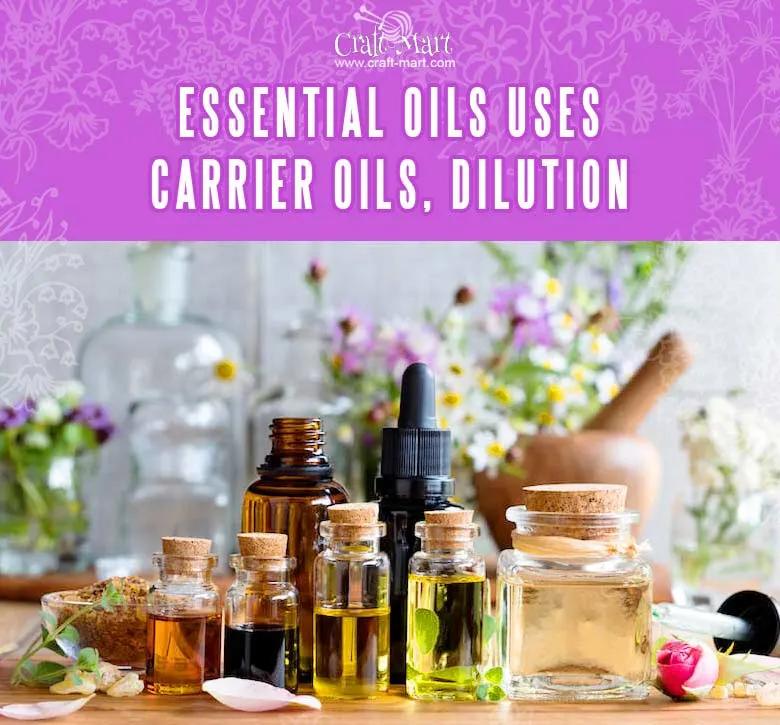 –
–
Ways to Use Essential Oils
Evaporate using Essential Oil Diffuser
How to dilute essential oils for your Ultrasonic Diffuser?
A good rule would be using RO or bottled water and adding no more than 12-15 drops of oil per 4oz of water.
How to diffuse essential oils correctly using Ultrasonic Mist Diffuser
For routine daily use place diffuser not to close to yourself to avoid breathing in the mist. For easing colds and congestions it’s fine to position the diffuser closer and breathing. Always protect your eyes when dealing with essential oils when they are being diffused close to your face. Read more here or watch this instructional video:
How to Diffuse Essential Oils ??(And Why You’d Want To)
Steam Inhalation
One of the oldest essential oils uses is steam inhalation – a traditional method of putting a few drops of oil or parts of a plant like eucalyptus leaves into the pan with boiling water. Cover your head with a blanket over the pan and breathe in the steam for 15 minutes or so.
With modern ultrasonic diffusers, this procedure seems to be more convenient although may be less effective. Hot steam helps with opening nasal passages and skin pores. Try both and see which one works the best.
Direct Inhalation
Like all concentrated chemicals, essential oils should be handled with extreme care when used undiluted even for just inhaling. The safest method would be to using a stylish necklace that works as an essential oil diffuser. This method is the simplest of all essential oils uses but can be really effective. For more information read Essential Oils Safety Guide.
Add to a Bath
Before adding essential oils to your bath water you need to dilute them to avoid skin irritation from the essential oil drops floating on the water surface. A bath requires only 5-8 drops total of essential oil in a carrier which can be a tablespoon of vegetable oil, a cup of whole milk, an ounce of aloe vera gel or bath salts. Using essential oils in a bath is really beneficial since oils work through skin and inhalation at the same time.
Use for Oil Pulling
Oil Pulling has been used for centuries as a traditional Indian folk remedy to prevent and cure bleeding gums, cracked lips, tooth decay in addition to strengthening gums, jaws, and teeth. It is simply an oral Ayurvedic detoxification procedure that is done by swishing a tablespoon of vegetable oil in your mouth for 10-15 minutes. Can you trust this old remedy? You bet!
Here is some scientific research:
- …oil pulling was significantly effective in killing S. mutants, one of the primary causes of cavities;
- …oil pulling also has statistically significant effects on reducing the gingival index;
- …clear indications of possible saponification and emulsification process, which enhances its mechanical cleaning action;
Out of all essential oils uses oil pulling is probably the most useful for people that have constant gum inflammation problems and spend hundreds of dollars on deep cleaning procedures.
Some oils can be added to food or drinks
FDA states the following in their “Code of Federal Regulations Title 21 – SUBCHAPTER B–FOOD FOR HUMAN CONSUMPTION”:
Essential oils, oleoresins (solvent-free), and natural extractives (including distillates) that are generally recognized as safe for their intended use, within the meaning of section 409 of the Act,…
You may view the whole list of 160 essential oils here.
It includes many popular oils like:
Allspice, Chamomile, Cinnamon, Citronella, Lavender, Lemongrass, Menthol, Neroli, Peppermint, Rose, Thyme, Ylang-ylang.
In fact, a large number of “Natural Flavors” used by food manufacturers already contain these essential oils. Of course, NOT ALL essential oils can be safely consumed. Please, do your own research and use common sense.
Apply to the Skin mixed with a carrier
Only a few essential oils are weak enough to be applied to the skin without dilution and only if directed by Clinically Certified Aromatherapist.
All other essential oils need to be diluted using carriers such as Aloe Vera gel, lotion or carrier oil.
What is carrier oil?
In general, any organic vegetable oil can be used as a carrier oil. There are two main reasons for mixing essential oils with carrier oils for skin application.Firstly, all essential oils are highly concentrated and can irritate or even burn your skin if applied non-diluted. Secondly, they evaporate into the air rather quickly. Carrier oils will keep them from evaporating. More details here.
The best carrier oils to mix with essential oils
Although any vegetable oil can be used as a carrier oil we’d like to recommend a few not very common oils that have more benefits in comparison with the usual list of suspects like Coconut, Jojoba, Avocado, Grapeseed or Olive oils.
These oils are amazingly good even without mixing them with essential oils:
- Argan oil – heals acne and dermatitis, dissolves scars, relieves Arthritic pain, helps with hair loss and dry hair, plus more
- Black cumin seed oil – extremely good for hair and skin, heals eczema and psoriasis, helps battling candida, fungus, asthma, allergies, and even a few forms of cancer like leukemia, brain, pancreas
- Castor oil – anti-fungal, anti-inflammatory, reduces back pain, helps with many skin problems
- Neem oil – is extremely beneficial for all skin problems, stimulates collagen production, promotes hair growth and health, used as natural bugs and pests repellent, historically used as an internal contraceptive
- Flaxseed Oil – a source of omega-3, has strong anti-inflammatory properties that help to deal with all kinds of skin or internal inflammation problems. Flaxseed Oil can be used internally and externally. It should be kept refrigerated.
How to mix essential oils with carrier oils
For most of the general needs like skin maintenance 1%-2% dilution would be adequate for adults and kids older than 8 years. Dealing with more serious problems such as acne, muscle or arthritis pain may require stronger solutions up to 10% or even 20% in rare cases.
How to Dilute Essential Oils?
When you intend to apply essential oils to your skin it is strongly recommended diluting them and testing on a small skin area first. This way you will have a lesser change experiencing a violent reaction in case you will turn out to be allergic to this essential oils or the plant.Children skin is also more sensitive to irritation, so for them, 1% dilution would be the same as 2% for adults.
Of course, not all essential oils have the same strength, and a few of them require even greater dilution. Each oil on our list has recommendations for acceptable uses and a list of known side effects.
Here is our simplified essential oil dilution chart
1% dilution – 1 drop of essential oil mixed with 1 teaspoon of carrier oil
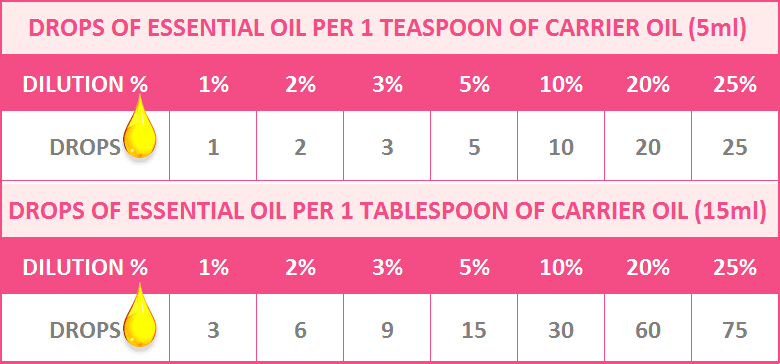
Alphabetical Essential Oils List
- Agar
- Ajowan Seed
- Allspice Berry
- Angelica
- Anise Seed
- Balsam Of Peru
- Basil
- Bay Laurel
- Bergamot
- Birch
- Black Pepper
- Blood Orange
- Camphor
- Caraway Seed
- Cardamom
- Carrot Seed
- Cassia
- Catnip
- Cedarwood
- Celery Seed
- Chamomile
- Cinnamon
- Citronella
- Clary Sage
- Clove Bud
- Coffee
- Copaiba
- Coriander
- Cranberry Seed
- Curry Leaf
- Cypress
- Davana
- Dill
- Elecampane
- Nutmeg
- Orange
- Oregano
- Palmarosa
- Parsley
- Patchouli
- Peppermint
- Petitgrain
- Pine Needle
- Ravensara
- Roman Chamomile
- Rose
- Rosehip
- Rosemary
- Rosewood
- Sage
- Sandalwood
- Schisandra
- Spearmint
- Spikenard
- Spruce
- Tangerine
- Tarragon
- Tea Tree
- Thyme
- Turmeric
- valerian
- Verbena
- Vetiver
- Wintergreen
- Wormwood
- Yarrow
- Ylang-ylang
- Zedoary
Essential Oils (D-M)
Main Benefits, Uses, Studies, Side Effects
 Davana Essential Oil is extracted by the steam distillation of flowers of the Davana plant.
Davana Essential Oil is extracted by the steam distillation of flowers of the Davana plant.
Davana oil benefits
- protects against viral attacks;
- fights infections;
- helps with menstrual spasms and cramps;
- relieves congestion and reduces coughs;
- speeds up healing;
Davana oil main uses
- diffuse it;
- apply topically diluted to 1%-3% with a carrier oil;
Side effects and notes:
Davana oil is also used in making perfumes and insect repellants.
 Dill essential oil is extracted through steam distillation of dried seeds and the whole plant of dill. Dill oil has beneficial sedating and calming effects on the nerves and the brain, making a person feel relaxed. More information…
Dill essential oil is extracted through steam distillation of dried seeds and the whole plant of dill. Dill oil has beneficial sedating and calming effects on the nerves and the brain, making a person feel relaxed. More information…
Dill oil benefits
- promotes digestion by stimulating the secretion of digestive juices;
- increases the formation of milk in the breasts;
- has disinfectant properties;
- helps with digestion problems;
- prevents fungal diseases like candida;
- anti-inflammatory;
- has cholesterol-lowering benefits;
Dill oil main uses
- diffuse it;
- apply topically diluted to 1%-3% with a carrier oil;
Side effects and notes:
Dill may lower blood sugar, so you should be careful and consult your doctor if you have diabetes.
 Elecampane is not well-known in the Western World. It was believed that Elecampane plant to have sprung from the place where Helen of Troy’s tears fell – hence its Latin name Inula helenium.
Elecampane is not well-known in the Western World. It was believed that Elecampane plant to have sprung from the place where Helen of Troy’s tears fell – hence its Latin name Inula helenium.
Elecampane oil benefits
- has antibacterial and antiseptic qualities;
- improves digestive health;
- good for dental care;
- can tighten the skin;
Elecampane oil main uses
- diffuse it;
- apply topically diluted to 1%-3% with a carrier oil;
Side effects and notes:
Elecampane root decoction can be taken internally (1 tablespoon 3 times a day) if you have a persistent cough. It helps to relieve coughs, aid in chest infections and respiratory difficulties, improves digestion, promotes urination.

Elemi (Canarium luzonicum) Essential Oil often used as a perfume, fragrance ingredient, and by paint industries. Elemi oil is actually believed to have been used in ancient Egypt for embalming mummies. It comes from the oleoresins of Canarium Luzonicum and Canarium Ovatum which are common in the Philippines.
Elemi oil benefits
-
- effective in cutting down pain related to colds, headaches, migraines, muscular pain;
- clears congestion;
- stimulates nervous responses;
- protects against every possible infection;
Elemi oil main uses
- diffuse it;
- apply topically diluted to 1%-3% with a carrier oil;
Side effects and notes:
 Eucalyptus Essential Oil is most often used to loosen phlegm and alleviate congestion associated with the common cold, flu or more severe conditions such as bronchitis. Studies show that eucalyptus oil is a vasodilator, meaning it helps to relax blood vessels and improve circulation.
Eucalyptus Essential Oil is most often used to loosen phlegm and alleviate congestion associated with the common cold, flu or more severe conditions such as bronchitis. Studies show that eucalyptus oil is a vasodilator, meaning it helps to relax blood vessels and improve circulation.
Eucalyptus oil benefits
- helps to overcome colds and flu;
- provides hair nourishment;
- effective in treating sinusitis;
- anti-microbial;
- kills mold;
- removes odor;
- expels parasites, kills lice;
- supports cardiovascular system;
Eucalyptus oil main uses
- diffuse it;
- apply topically diluted to 1%-3% with a carrier oil;
Side effects and notes:
Eucalyptus oil is rich in cineole, an antiseptic that kills the bacteria that can cause bad breath. It is beneficial for people with joint pain and arthritis.
 Fennel essential oil is produced through the steam distillation of crushed fennel seeds.
Fennel essential oil is produced through the steam distillation of crushed fennel seeds.
Fennel oil benefits
- has antiseptic properties.;
- helps cure constipation;
- cures indigestion;
- kills parasitic worms;
- eases painful menstruation;
- promotes lactation;
- treats a chronic cough;
Fennel oil main uses
- diffuse it;
- apply topically diluted to 1%-3% with a carrier oil;
Side effects and notes:
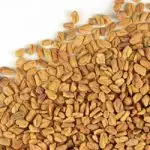 Fenugreek essential oil from the ancient times was known as the remedy for promoting lactation. In addition to that, it fights certain viruses, prevents the cells from free radical damage, lowers blood glucose, boosts blood circulation, reduces inflammation on the skin.
Fenugreek essential oil from the ancient times was known as the remedy for promoting lactation. In addition to that, it fights certain viruses, prevents the cells from free radical damage, lowers blood glucose, boosts blood circulation, reduces inflammation on the skin.
Fenugreek oil benefits
- helps to increase testosterone levels;
- can help reducing stomach acidity;
- preserves brain function;
- boosts blood circulation;
- fights against cancer development;
- treats menstrual pain;
- promotes lactation;
Fenugreek oil main uses
- diffuse it;
- apply topically diluted to 1%-3% with a carrier oil;
Side effects and notes:
Fenugreek oil is one of the few substances that stimulate beta cells of the pancreas. It is often used for soothing pain and relaxing aching muscles.

Fir Needle Essential Oil is extracted through a process of steam distillation from fir needles. It has a high concentration of antiseptic organic compounds that stimulate the immune system and prevent dangerous infections. Fir needle essential oil can actually decrease the number of bacteria in your body that creates that foul odor.
Fir Needle oil benefits
- Prevents dangerous infections;
- Improves respiratory function;
- Eliminates offensive body odor;
- Facilitates anti-inflammatory tissue healing and pain relief;
- Shows anti-tumor activity;
Fir Needle oil main uses
- diffuse it;
- apply topically diluted to 1%-3% with a carrier oil;
Side effects and notes:
 Frankincense Essential Oil is produced by steam distillation of the resin of the Boswellia Carterii (also called Boswellia Sacra) and Boswellia serrata (from India). Boswellia Serrata resin and the essential oil is cheaper but also less powerful.
Frankincense Essential Oil is produced by steam distillation of the resin of the Boswellia Carterii (also called Boswellia Sacra) and Boswellia serrata (from India). Boswellia Serrata resin and the essential oil is cheaper but also less powerful.
Frankincense oil benefits
- anti-cancer activity in vitro studies;
- strong antiseptic and disinfectant;
- reduces the appearance of scars and acne;
- reduces menopause symptoms;
- useful in lowering levels of anxiety;
- reduces painful inflammation;
- good sleep aid;
- helps the digestive system;
Frankincense oil main uses
- diffuse it;
- add 5-10 drops in a bath;
- apply topically diluted to 3%-5% with a carrier oil;
Side effects and notes:
No human clinical trials were conducted in spite of a few positive in vitro Frankincense oil studies on cancer cells. As with many other natural remedies, it may not be recommended as a primary cancer treatment drug. Follow recommendations of your doctor.
 Galbanum (Ferula Galbaniflua) oil has been known since the times of the ancient Greeks. It was mixed in bath water, burnt in incense sticks, used in skin balms, and as a perfume.
Galbanum (Ferula Galbaniflua) oil has been known since the times of the ancient Greeks. It was mixed in bath water, burnt in incense sticks, used in skin balms, and as a perfume.
Galbanum oil benefits
- strongest antibacterial activity against MRSA and MSSA;
- rejuvenates aging skin;
- stimulates the circulation of blood and lymph;
- good for healing wounds;
- reduces scar and acne marks;
Galbanum oil main uses
- diffuse it;
- apply topically diluted to 3%-5% with a carrier oil;
Side effects and notes:
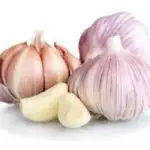 Garlic oil is produced by the steam distillation of crushed garlic.
Garlic oil is produced by the steam distillation of crushed garlic.
Garlic oil benefits
- has anti-inflammatory and antifungal properties;
- may reduce acne problem;
- can treat hair problems and boost hair growth;
- reduces blood pressure;
- fights ear infection;
- thins the blood;
- helps in diabetes management;
Garlic oil main uses
- apply topically diluted to 1%-3% with a carrier oil;
- for ear infection use a cotton swab with 1%-3% diluted oil and apply around the entrance of the ear canal;
- for hair growth massage 25%-30% solution into your scalp;
Side effects and notes:
Another way of dealing with an ear infection:
Dab a small cotton ball in the oil, but do not soak it completely. Then, place the cotton ball against your ear and place a piece of gauze to hold it in place. Oil’s vapors will do the job.
 Geranium Essential Oil is extracted through steam distillation of stems and leaves of the geranium plant. It is nontoxic and nonirritant.
Geranium Essential Oil is extracted through steam distillation of stems and leaves of the geranium plant. It is nontoxic and nonirritant.
Geranium oil benefits
- Minimizes inflammation;
- Can suppress candida cell growth;
- Relieves stress;
- Reduces depression;
- Improves dental health;
- Alleviates the effects of menopause;
- Benefits the health of your skin;
- Reduces blood pressure;
- Reduces wrinkles by tightening facial skin;
Geranium oil main uses
- diffuse it;
- apply topically diluted to 1%-3% with a carrier oil;
- mix 10 drops with 1 cup of water and 2-3 tablespoons of AC Vinegar to use as a hair conditioner;
Side effects and notes:
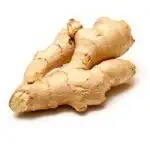 Ginger Essential Oil’s therapeutic benefits come from gingerols, the oily resin from the root that acts as a highly potent antioxidant and anti-inflammatory agent.
Ginger Essential Oil’s therapeutic benefits come from gingerols, the oily resin from the root that acts as a highly potent antioxidant and anti-inflammatory agent.
Ginger oil benefits
- Treats upset stomach;
- effective against malaria;
- Aids respiratory problems;
- Reduces inflammation;
- High levels of antioxidants;
- Relieves anxiety;
- Alleviates muscle and menstrual pain;
Ginger oil main uses
- diffuse it to boost mood or deal with respiratory problems;
- apply topically diluted to 1%-3% with a carrier oil;
- add 1 drop to a cup of tea;
Side effects and notes:
 Goldenrod essential oil may not be the best known although it has a variety of therapeutic uses. It has been approved by the German Commission E for the treatment of urinary tract infections. It is also a popular treatment for respiratory conditions, arthritis, and seasonal allergies.
Goldenrod essential oil may not be the best known although it has a variety of therapeutic uses. It has been approved by the German Commission E for the treatment of urinary tract infections. It is also a popular treatment for respiratory conditions, arthritis, and seasonal allergies.
Goldenrod oil benefits
- treats bladder and urinary tract infections ;
- will make your skin look younger;
- may ease respiratory problems and treat sore throats;
- can ease toothaches;
- contains antifungal properties;
- can ease stress;
Goldenrod oil main uses
- diffuse and inhale;
- apply topically diluted to 1%-3% with a carrier oil;
- for a sore throat and toothaches add 2-3 drops to a glass of water, gargle, swish, and spit;
Side effects and notes:
- diffuse and inhale;
- add 2-3 drops to a glass of water, gargle, and spit;
Interesting facts: Henry Ford gave Thomas Edison a Ford Model T with rubber tires produced from goldenrod. Goldenrod was thrown into the Boston harbor at the time of the Boston tea party.
 Grapefruit essential oil is an extract that comes from the peel of the Citrus paradisi grapefruit fruit. It is known that consuming grapefruit can help losing weight. Grapefruit oil provides similar benefit and can be taken internally, according to FDA, diluted in liquids or food in small doses.
Grapefruit essential oil is an extract that comes from the peel of the Citrus paradisi grapefruit fruit. It is known that consuming grapefruit can help losing weight. Grapefruit oil provides similar benefit and can be taken internally, according to FDA, diluted in liquids or food in small doses.
Grapefruit oil benefits
- weight loss;
- helps reducing yeast and bacteria (candida);
- stops sugar craving;
- helps to eliminate odor;
- great for disinfecting surfaces;
- cures acne;
- can increase your mental focus;
Grapefruit oil main uses
- diffuse it;
- apply topically diluted to 10%-30% with a carrier oil;
- add 3-4 drops to your smoothie or drink;
Side effects and notes:
Grapefruit oil is recognized as safe for consumption by the FDA, but only when you use a 100% pure, therapeutic-grade essential oil that only includes one ingredient: grapefruit (Citrus paradisi) rind oil. Add no more than 1 drop per glass to be safe.
 Helichrysum angustifolium and Helichrysum italicum are the two names for Helichrysum flower native to France, Italy, and a few neighboring countries. It is very rare and expensive, but unlike other essential oils which have a short shelf life, Helichrysum oil can be last for a very long time.
Helichrysum angustifolium and Helichrysum italicum are the two names for Helichrysum flower native to France, Italy, and a few neighboring countries. It is very rare and expensive, but unlike other essential oils which have a short shelf life, Helichrysum oil can be last for a very long time.
Helichrysum oil benefits
- Prevents fungal infections;
- Treats Anemia;
- Dissolves scars;
- Fights infections;
- Lowers fever;
- Relieves inflammation;
- Dissolves blood clots;
- Can curb hemorrhaging;
- Treats spasms;
- Detoxifies Liver;
Helichrysum oil main uses
- add a few drops to a bath with Epsom Salt for skincare and relaxation;
- diffuse it;
- apply topically diluted to 1%-3% with a carrier oil;
Side effects and notes:
Helichrysum Italicum has many promising pharmacological activities because it operates as a natural antibiotic, antifungal and antimicrobial. Flowers and leaves are the most useful parts of the plant. If you have a rash or poison ivy, applying helichrysum mixed with lavender oil can help cool and soothe any itching.
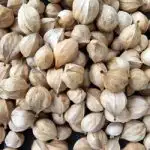 Hickory Nut Essential Oil is one of the most aromatic oils available. It also has important health benefits that can help people gain weight, enhance development and growth, increase circulation, protect kidneys and heart, and even calm the nerves.
Hickory Nut Essential Oil is one of the most aromatic oils available. It also has important health benefits that can help people gain weight, enhance development and growth, increase circulation, protect kidneys and heart, and even calm the nerves.
Hickory nut oil benefits
- Enhances energy;
- Assists with growth and development;
- Helps with bone health;
- Helps with metabolic functions;
- Cures Eczema and Psoriasis;
- Supports the digestive system;
- Helps with weight gain;
- Treats thyroid problems ;
Hickory nut oil main uses
- diffuse it;
- add 10 drops to a bathtub;
- apply topically diluted to 3%-5% with a carrier oil;
Side effects and notes:
 Although Hops are mostly famous throughout the world for flavoring beers, Hops essential oil is used extensively in aromatherapy.
Although Hops are mostly famous throughout the world for flavoring beers, Hops essential oil is used extensively in aromatherapy.
Hops oil benefits
- Treats insomnia;
- Reduces pain;
- Improves sexual performance;
- Reduces menstrual cramps;
- improves the sheen and strength of the hair;
- Cures psoriasis;
- Eliminates headaches;
Hops oil main uses
- diffuse it;
- apply topically diluted to 1%-3% with a carrier oil;
Side effects and notes:
- The sedative quality can often exacerbate that mood;
- Test topical application on a small area if your skin is particularly sensitive or prone to breakouts;
 From ancient times, Hyssop (hyssopus officinalis) has been used as an antiseptic agent, a purifier, and cleanser, The Bible mentions it in verse 7 of Psalm 51: “Thou shalt purge me with hyssop, and I shall be clean.”
From ancient times, Hyssop (hyssopus officinalis) has been used as an antiseptic agent, a purifier, and cleanser, The Bible mentions it in verse 7 of Psalm 51: “Thou shalt purge me with hyssop, and I shall be clean.”
Hyssop oil benefits
- Fights parasites;
- Fights infections;
- Helps with respiratory conditions;
- Relieves muscle pain and spasms;
- Helpsdigestion;
- Promotes skin health;
Hyssop oil main uses
- diffuse it;
- apply topically diluted to 25%-50% with a carrier oil;
- drink – add 1 drop per cup of tea (only highest quality);
Side effects and notes:
Hyssop improves and promotes circulation which helps cure diseases associated with poor circulation, such as rheumatism, arthritis, and gout.
 Historically, Jasmine oil has been used in China to help the body detox and relieve respiratory and liver disorders. It also has been used to ease the birthing process and reducing the severe pains of labor and for decreasing milk production.
Historically, Jasmine oil has been used in China to help the body detox and relieve respiratory and liver disorders. It also has been used to ease the birthing process and reducing the severe pains of labor and for decreasing milk production.
Jasmine oil benefits
-
- Eases depression and anxiety;
- Helps with falling asleep;
- Decreases symptoms of menopause and PMS;
- Helps with post-pregnancy symptoms;
- Reduces respiratory infections;
- Boosts
- concentration;
- Promotes healthy skin and fight blemishes;
Jasmine oil main uses
- diffuse it;
- can be applied topically without adding a carrier oil;
Side effects and notes:
Jasmine essential oil has effective anti-inflammatory properties that give it applications in a variety of complaints caused by inflammation including rheumatism and gout.
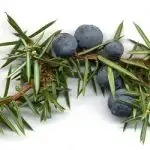 Juniper berry essential oil comes from the berries and needles of the Juniperus osteosperma plant.
Juniper berry essential oil comes from the berries and needles of the Juniperus osteosperma plant.
Juniper oil benefits
- May Help Heal and Protect Skin;
- Relaxant and Sleep Aid;
- Boosts Digestion;
- Treats Heartburn and Acid Reflex Relief;
- Powerful Antioxidant;
- Might Help Reduce High Blood Pressure;
- Insect Repellent;
- Might Reduce Cellulite;
Juniper oil main uses
- diffuse it;
- drink – add 1-2 drops to a cup of tea or water;
- apply topically diluted to 50% with a carrier oil;
Side effects and notes:
- Juniper berry essential oil is FDA-recognized as safe for consumption;
- Only ingest juniper essential oil when you use a very high-quality oil brand;
Juniper essential oil helps cure toothaches, strengthens the grip of gums on your teeth, stops hair loss, and protects them from loosening or falling out.
 Labdanum Essential Oil also known as Cistus or Rock Rose is primarily used as a fragrance in the perfume industry.
Labdanum Essential Oil also known as Cistus or Rock Rose is primarily used as a fragrance in the perfume industry.
Labdanum oil benefits
- fights infections;
- rejuvenate skin;
- reduce arthritis pain and swelling;
- helps to relax;
- helps reducing hemorrhoids;
- fights coughs, colds and bronchitis;
Labdanum oil main uses
- diffuse it;
- add 5-10 drops to a bathtub;
- apply topically diluted to 3%-5% with a carrier oil;
Side effects and notes:
- Avoid direct sunlight or UV rays for up to 12 hours after topical application;
- Do not use undiluted on the skin;
Labdanum Essential Oil is often recommended for meditation in combination with sandalwood or frankincense and rose.
 Lavender Essential Oil induces sleep sometimes used as an alternative treatment for insomnia. The smell of lavender essential oil is potent for many types of bugs like mosquitoes, midges, and moths.
Lavender Essential Oil induces sleep sometimes used as an alternative treatment for insomnia. The smell of lavender essential oil is potent for many types of bugs like mosquitoes, midges, and moths.
Lavender oil benefits
- Reduce anxiety and stress;
- Improve brain function;
- Improve sleep;
- Help to heal burns and wounds;
- Protect against diabetes symptoms;
- Slow aging with powerful antioxidants;
- Alleviate headaches;
- Relieve pain;
- Can help reverse diabetes;
Lavender oil main uses
- diffuse it;
- add to shampoo or hair conditioner;
- make a body spray with 5 drops of oil per cup of water;
- apply topically diluted to 50% with a carrier oil;
- add 1-2 drops to your smoothie, food or drink;
Side effects and notes:
- Lavender oil is rather gentle to the skin and doesn’t really need to be diluted with a carrier oil;
- Steam-distilled solvent-free Lavender oil is safe to take internally according to FDA;
Lavender Oil is on the list of the most effective essential oils for hair growth.
 Ledum Essential Oil has been widely recognized for its medicinal benefits for hundreds of years.
Ledum Essential Oil has been widely recognized for its medicinal benefits for hundreds of years.
Ledum oil benefits
- fights premature aging, wrinkles and, other skin blemishes;
- boosts the metabolism and promotes fat burning;
- eliminates headaches;
- balances thyroid function;
- make help with curbing cravings or addictions;
- lowers anxiety levels;
Ledum oil main uses
- diffuse it;
- add to cleaning solutions;
- apply topically diluted to 1%-3% with a carrier oil;
Side effects and notes:
- use low or moderate amounts of this oil to test if you are allergic to it;
- this oil is NOT recommended for ingesting even at low concentrations;
 Unlike other essential oils, Lemon (Citrus limon) Essential oil is usually cold pressed. What’s does this mean to you? It has a higher level of Phototoxicity as all cold-pressed oils. Of all the essential oils, Lemon oil may be one of the most powerful anti-microbial agents according to the International Journal of Food Microbiology.
Unlike other essential oils, Lemon (Citrus limon) Essential oil is usually cold pressed. What’s does this mean to you? It has a higher level of Phototoxicity as all cold-pressed oils. Of all the essential oils, Lemon oil may be one of the most powerful anti-microbial agents according to the International Journal of Food Microbiology.
Lemon oil benefits
- Lemon oil is a good antibacterial cleaner;
- works well as an insect repellent;
- helps with indigestion;
- soothes a sore throat;
- helpful for reducing weight;
- helps to eliminate dandruff;
- promotes healthy hair growth;
Lemon oil main uses
- diffuse it;
- add a few drops to face wash;
- add a few drops to laundry;
- apply topically diluted to 3%-5% with a carrier oil;
Side effects and notes:
- expressed lemon oil is phototoxic and may cause skin reaction outside;
- cover all affected skin and protect it from sun or UV exposure for up to 12 hours;
 Lemongrass is widely used in Chinese and Thai recipes.
Lemongrass is widely used in Chinese and Thai recipes.
Lemongrass oil benefits
- Reduces Depression;
- Relieves Pain;
- Lowers Fever;
- Heals Wounds;
- Strengthens hair follicles;
- Removes Flatulence;
- Active against Candida;
- Cures Fungal Infections;
- Promotes Lactation;
- sedative;
- Kills Insects;
Lemongrass oil main uses
- diffuse it;
- add -12 drops to a cup of tea or soup;
- make a bug spray 40-50 drops per cup of water or Witch Hazel;
- apply topically diluted to ~3% with a carrier oil;
Side effects and notes:
- test small amounts on your skin for reaction;
- not recommended for people with sensitive skin and lung problems;
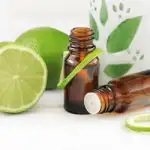 Lime Essential Oil is extracted by cold compression of fresh lime peels or by steam distillation of its dried peels. Lime essential oil has antiseptic properties, and it can cure infections.
Lime Essential Oil is extracted by cold compression of fresh lime peels or by steam distillation of its dried peels. Lime essential oil has antiseptic properties, and it can cure infections.
Lime oil benefits
- Cures Toothaches;
- Treats Bacterial Infections;
- Reduces Fever;
- Detoxifies your liver;
- Prevents hair loss;
Lime oil main uses
- diffuse it;
- added to food in small amounts like 1-2 drops per cup;
- apply topically diluted to 1%-3% with a carrier oil;
Side effects and notes:
 Mandarin essential oil in spite of being rather mild has many effective healing properties. The oil is extracted through a cold-pressed process.
Mandarin essential oil in spite of being rather mild has many effective healing properties. The oil is extracted through a cold-pressed process.
Mandarin oil benefits
- Relieves Pain;
- Eliminates symptoms of anxiety;
- Protects Food from Bacteria;
- Reduces acne and scars;
- Inhibits of tumor growth;
Mandarin oil main uses
- diffuse it;
- apply topically diluted to 5-10% with a carrier oil;
- use undiluted for acne treatment with q-tip;
Side effects and notes:
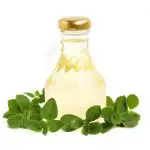 Marjoram essential oil is extracted by steam distillation of both fresh and dried leaves of the marjoram plant. Marjoram is a common Oregano substitute because of their likeness, but marjoram has a finer texture and a milder flavor. Greek mythology tells us that Aphrodite, the goddess of love, was a huge fan of this herb. This is why it has been used for hundreds of years for making love potions.
Marjoram essential oil is extracted by steam distillation of both fresh and dried leaves of the marjoram plant. Marjoram is a common Oregano substitute because of their likeness, but marjoram has a finer texture and a milder flavor. Greek mythology tells us that Aphrodite, the goddess of love, was a huge fan of this herb. This is why it has been used for hundreds of years for making love potions.
Marjoram oil benefits
- Women’s issues and hormonal balance;
- Type 2 Diabetes management;
- Cardiovascular health;
- Gastric ulcer prevention;
- Pain relief;
- can lower blood pressure;
- Digestive aid;
Marjoram oil uses
- diffuse it;
- by mouth 1-2 drops per cup;
- apply topically diluted to 1%-3% with a carrier oil;
Side effects and notes:
Consult your doctor before considering taking Marjoram supplements by mouth in any form if you have:
- Diabetes;
- Seizures;
- Ulcers;
- Asthma;
- Bleeding disorders;
- Slow heart rate;
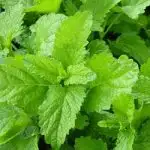 Melissa essential oil or lemon balm oil has an ability to treat cold sores, herpes, without the need for antibiotics. Melissa is one of the most studied essential oils as a natural treatment for Alzheimer’s and dementia. (2002 Study) | (2011 Study)
Melissa essential oil or lemon balm oil has an ability to treat cold sores, herpes, without the need for antibiotics. Melissa is one of the most studied essential oils as a natural treatment for Alzheimer’s and dementia. (2002 Study) | (2011 Study)
Melissa oil benefits
- Treats infections;
- Helps to stop dementia or Alzheimer’s;
- Promotes skin health, treats eczema and acne;
- Fighting depression;
- Potential Anti-Tumor benefits;
- Relieves PMS;
- Reduces high blood pressure;
Melissa oil main uses
- diffuse it;
- apply topically diluted to 1%-3% with a carrier oil;
Side effects and notes:
- Melissa oil is supposed to be one of the most expensive essential oils;
- For internal use buy this oil from reputable sellers only;
 Moringa Essential Oil is extracted from the cold-pressing of the seeds of Moringa oleifera – the “miracle tree”.
Moringa Essential Oil is extracted from the cold-pressing of the seeds of Moringa oleifera – the “miracle tree”.
Moringa oil benefits
- Helps to control blood sugar levels;
- Protects the heart;
- Stimulates hair growth;
- Provides relief from Rheumatoid Arthritis;
- Support liver and kidney health;
Moringa oil main uses
- add it to your hair conditioner or shampoo;
- can be applied to the skin undiluted or used as a carrier oil;
- can be taken internally in small amounts;
Side effects and notes:
- Make sure that no solvents were used for the production of the oil;
- Test on your skin for allergic reaction before attempting to use it on a wide area or internally;
 Mugwort Essential Oil has a different reputation in Europe and Asia. Chinese doctors used it for hundreds of years for treating ailments. In Europe, it got a questionable notoriety as the witchcraft accessory. Mugwort (Artemisia Vulgaris) oil is extracted by steam distillation of leaves, buds, and flowering tops of the Mugwort tree.
Mugwort Essential Oil has a different reputation in Europe and Asia. Chinese doctors used it for hundreds of years for treating ailments. In Europe, it got a questionable notoriety as the witchcraft accessory. Mugwort (Artemisia Vulgaris) oil is extracted by steam distillation of leaves, buds, and flowering tops of the Mugwort tree.
Mugwort oil benefits
- Anti-epileptic;
- Can cure digestive disorders;
- Kills parasites and intestinal worms;
- Provides menstrual relief;
Mugwort oil main uses
- it is recommended to be used topically only diluted to 1%-2% with a carrier oil;
Side effects and notes:
- Do NOT ingest this oil;
- Do not use in high doses or high concentration;
- To treat intestinal worms apply topically around the stomach area;
Mugwort essential oil is toxic and irritant in high concentration. Now we can understand why its European reputation is not so great and you should always consult your doctor before using it.
 Mustard essential oil is extracted by steam distillation of mustard seeds soaked in water. Although using cold-pressed and distilled Mustard oil for topical applications and even for cooking is wide-spread in some Asian countries, FDA permits only topical usage.
Mustard essential oil is extracted by steam distillation of mustard seeds soaked in water. Although using cold-pressed and distilled Mustard oil for topical applications and even for cooking is wide-spread in some Asian countries, FDA permits only topical usage.
Mustard oil benefits
- Has antibacterial and antifungal properties;
- Help lowering bad cholesterol and raise good HDL cholesterol;
- High in omega-3 fatty acids;
- Treats gum disease;
- May provide relief for arthritis;
- Improves hair health;
Mustard oil main uses
- apply topically diluted to 1%-3% with a carrier oil;
Side effects and notes:
- This oil is not recommended for internal use;
- Avoid if pregnant;
 Myrrh is a resin that comes from a tree called Commiphora myrrha, common in Africa and the Middle East. Myrrh essential oil is made from the sap via steam distillation. Two primary active compounds of myrrh oil are called terpenoids and sesquiterpenes. Both have anti-inflammatory and antioxidant effects.
Myrrh is a resin that comes from a tree called Commiphora myrrha, common in Africa and the Middle East. Myrrh essential oil is made from the sap via steam distillation. Two primary active compounds of myrrh oil are called terpenoids and sesquiterpenes. Both have anti-inflammatory and antioxidant effects.
Myrrh oil benefits
- Anti-parasitic;
- Skin rejuvenation;
- Destroys fungus and some parasites;
- Has antioxidant properties;
- Helps with preventing gum disease;
- May help to treat skin cancer;
- Has antioxidant properties;
Myrrh oil main uses
- diffuse it;
- apply topically diluted to 1-10% with a carrier oil;
Side effects and notes:
- may lower blood sugar;
- may lower blood pressure;
 Myrtle belongs to the same plant family as eucalyptus and tea tree. Myrtle oil has been extensively researched for its potential benefits on hormone imbalances, specifically of the thyroid and ovaries. Myrtle oil is obtained by steam distilling the flowers, leaves, and stem.
Myrtle belongs to the same plant family as eucalyptus and tea tree. Myrtle oil has been extensively researched for its potential benefits on hormone imbalances, specifically of the thyroid and ovaries. Myrtle oil is obtained by steam distilling the flowers, leaves, and stem.
Myrtle oil benefits
- Helps with insomnia;
- Fights acne;
- Helps with hemorrhoids;
- Treats respiratory problems;
- Good deodorant;
- Helps with arthritis;
- Mosquitoes repellent;
Myrtle oil main uses
- diffuse it;
- apply topically diluted to 1%-3% with a carrier oil;
Side effects and notes:
You can make infused myrtle oil at home using myrtle leaves and any carrier oil.
